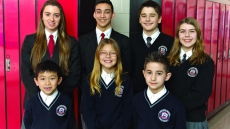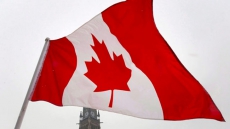OTTAWA — The commander of Canada's combat operations in the Middle East says preparations to send air strikes into Syria are in the final stages and bombs could be falling on Islamic State targets within days.
Brig.-Gen. Dan Constable, speaking in a conference call from Kuwait on Thursday, said Canada's allies are "excited" that the CF-18 jets will expand their operations beyond Iraq, where they have been conducting missions for six months.
Since last September, the U.S., and at least three Persian Gulf countries, have also been hitting extremist targets in Syria, which is tangled in a brutal, four-year-long, civil war.
Constable said Canadian pilots are being briefed on the new territory and reviewing potential threats in specific areas.
"From our perspective, operations in Syria are going to be very, very close to those over Iraq in terms of how we mitigate threats, surface-to-air threats," he said. "As you can imagine, the safety of my aircrew is paramount for me and I'm very confident we have all of the procedures in place to deal with any threats that could be presented."
Constable would not say whether pilots have been instructed to attack Syrian air defence batteries that lock on to them with radar, nor would he comment on the state of that country's early warning system.
Defence Minister Jason Kenney has said strikes against extremists will take place in areas where there is no Syrian air-defence radar, but open-source technical reports show as many as five of the country's 31 early warning sites are located in the region. Whether they are still operational is unclear.
Earlier this week, Parliament approved a motion that extended the combat mission for a year and expanded the campaign to include missions in Syria, where the Islamic State in Iraq and the Levant holds sway over a vast swath of territory in the eastern and northern portions of the country.
The CF-18s flew six bombing missions in Iraq over the last 10 days, but none of them involved supporting the major offensive in Tikrit, where Iranian-backed Shiite militias and the Iraqi army have fought a bloody, protracted battle.
The U.S.-led coalition initially held back air support because of the involvement of Iran's elite Republican Guard, known as the Quds Force, in training the militias. It has since relented and conducted a series of strikes — beginning March 25 — that paved the way for government forces to advance.
Foreign Affairs Minister Rob Nicholson insisted last week that Canada does not "align with the Iranians."
Yet, Constable confirmed on Thursday there is no ban on Canadians supporting the Tikrit operation. The absence of CF-18s from the strike roster was a decision by the American commanders who allot targets.
"There is no specific prohibition," he said. "We would strike in support of the government of Iraq, Iraqi security forces and it just so happens in the Tikrit area, there's enough coalition strike assets that we were assigned in other areas on that day."




